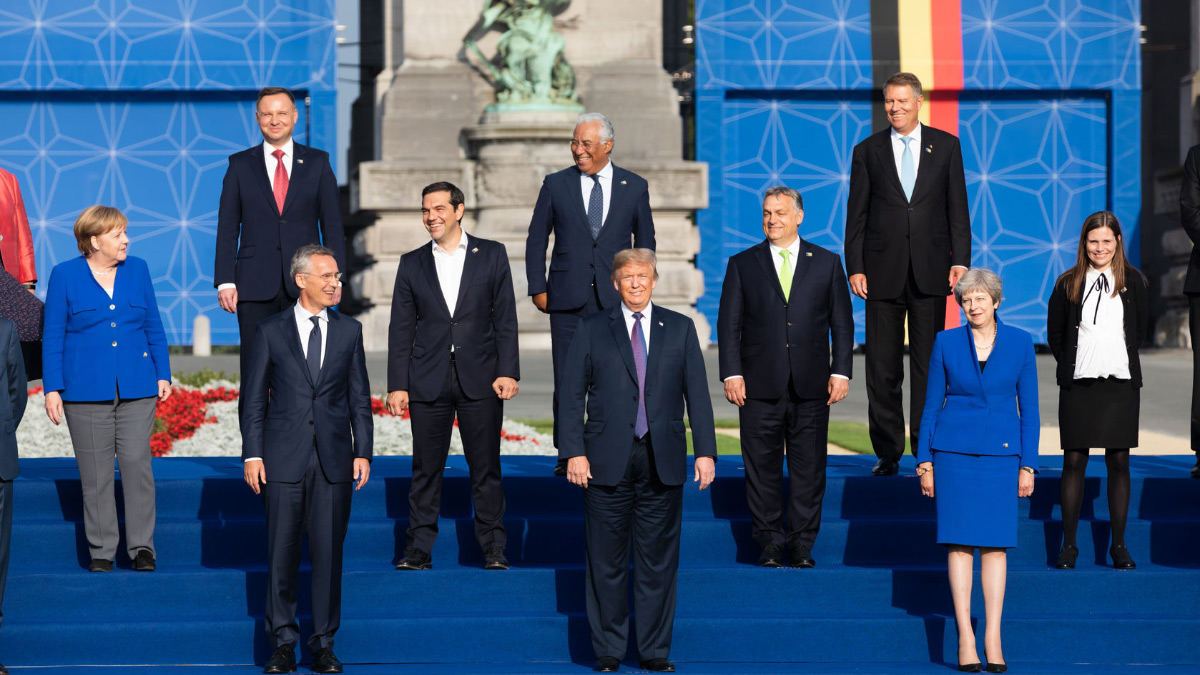The American foreign policy establishment has again gone into convulsion—this time over President Trump’s reported desire to leave the NATO alliance—which is similar to the apoplexy it experienced when he declared the withdrawal of a mere 2,000 U.S. troops from Syria. Commentators have breathlessly intoned that NATO won the Cold War, led the way to post-World War II global prosperity, was the linchpin to stability in Europe, and was the key to not only European security but American security as well.
Establishment commentators also imply that Trump has suspect motives for ordering the U.S. to leave NATO, because his withdrawal of forces from Syria, his repeated slavish praise of Russian leader Vladimir Putin, his desire to remove economic sanctions from Russia and Putin’s oligarchs, and his benefitting from Russia’s attempt to disrupt the 2016 elections may indicate that he is a pawn of Russia.
Even if this were true—as it may be—the time has come to reassess whether the U.S. needs to stay in an outdated alliance that was designed to deter the Soviet Union from an attack on Western Europe during the Cold War, which ended more than a quarter century ago. In fact, once the Soviet Union fell in 1991, the United States should have turned NATO over to the by-then rich Europeans to deter a much-diminished Russia. It was no longer 1949, when the Soviets still had a massive tank army in central Europe, and most of Western Europe was in rubble from World War II.
Despite today’s hype of a resurgent Russian threat, Russia still has a GDP roughly equivalent to Spain. In contrast, the Europeans combined have a GDP greater than the United States. However, Trump is correct that the wealthy Europeans are free riders on massive and excessive U.S. defense spending. For example, the mighty German economy only spends one percent of GDP on defense. And despite establishment analysts perennially noting that the only time NATO’s Article V mutual defense clause has been invoked was after the Cold War ended in response to the 9/11 attacks against the United States, European efforts in Afghanistan have been mostly window dressing, and in any major war, the United States would be defending Europe and not vice versa.
For most of American history, the country followed the prescription of George Washington and Thomas Jefferson to avoid “permanent” and “entangling” alliances, respectively. Only after World War II did the United States go wild in policing the world via Pax Americana, with NATO being one of the first permanent alliances established, which has now turned into an entangling end in itself. Washington and Jefferson realized that the United States had geographical advantages that other countries could only dream about—two huge ocean moats separating it from the world’s usual zones of conflict—and thus had the luxury of using only temporary alliances to enhance its security.
In contrast, historically, Russia has had very poor intrinsic security; because of bad geography and topography on its western flank, it has been invaded many times—by, for example, Poland, Sweden, France, and Germany—the last of which resulted in 25 million dead Russians at the hands of Adolf Hitler. Two primary reasons exist for the failure of post-Cold War democracy in Russia and the rise of the now autocratic Putin: 1) given Russia’s precarious security situation, it may be impossible for a stable democracy to take root there; and 2) the eastward expansion to Russia’s borders of NATO, an alliance hostile to Russia (think about what the U.S. reaction would be to Russia forming an alliance with Mexico), after promising Russia that it would not happen, contributed to the historically aware country’s attraction to an ex-KGB authoritarian ruler.
Putin is certainly no gem, meddling in the U.S. election, stealing Crimea from Ukraine by armed force, and surreptitiously invading eastern Ukraine; but Ukraine is very important within Russia’s security buffer. Although Presidents Barack Obama and Trump both should have taken stiffer action in response to Putin’s election meddling to deter future interference, that has little to do with whether the United States still needs to formally pledge to defend affluent European nations against a second-rate conventional power, such as Russia. Even in the nuclear weapons area, in which Russia is still a superpower, the British and French nuclear forces provide a deterrent against a conventional or nuclear attack by Russia on Europe.
In a post-Cold War world—with the rise of China and $150 trillion in unfunded American liabilities (Social Security, Medicare, and federal and state pensions), including a $22 trillion U.S. national debt—the Europeans need to take over the burden of their own defense so that the U.S. can focus on more important things, such as its own prosperity and thus security. This change would entail the U.S. withdrawing from NATO but potentially acting as an informal balancer of last resort only in the unlikely event, given the aforementioned wealth disparity, that the balance of power between Russia and Western Europe got out of whack.
Despite the histrionics from establishment pundits and even President Trump’s potentially suspect motives, the best U.S. policy is to withdraw from NATO, even if it helps the nefarious Putin in the short term. In the long term, the move will enhance both U.S. and European security by making American policy more independent and the Europeans more self-reliant.

















